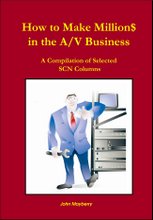The FCC has completely botched this one... and this is only one of the affected industries.
CBA asks FCC to reject coalition white space proposal as discriminatory
The Community Broadcasters Association (CBA) last week asked the FCC to reject a request from the Public Interest Spectrum Coalition (PISC) that it said would leave LPTV stations with less protection than full-power broadcasters from interference generated by unlicensed white space devices.
The CBA comments filed May 8 are in response to a March 19 Petition for Reconsideration submitted to the commission by PISC. In it, the coalition asked the commission to reconsider how it protects LPTV, Class A, translator and booster stations from white space device interference. These broadcasters should “receive expanded protection in the database, but only by demonstrating to the commission the number of viewers outside the currently protected signal contours that would be harmed” by interference from white space devices given extended contour protection, it said.
Reacting to the petition, the CBA said the PISC request would discriminate against LPTV stations, “which so often serve audiences that have limited or no alternatives for the specialized programming they receive.”
The association also reminded the commission of information it recently provided the FCC showing LPTV stations have “a vastly greater representation of minority and female ownership than any other medium of communication in this nation.” The CBA filing rhetorically asked why the coalition thinks “that minority and female station owners providing ethnic and other niche services are less important than full-power broadcasters, particularly when minority and female ownership of full-power television stations falls so far below the commission’s goal?”
The association’s filing wondered how LPTV stations, which are primarily small business, are supposed to fund determining where their viewers live. It also questioned where the FCC is supposed to get the resources necessary to “evaluate case-by-case requests for protection that are likely to be filed by hundreds of LPTV stations.”
About This Blog:
Integrating complex electronic projects requires industry individuals keep abreast of the latest technological trends.
Some things are important, many ironic, others outright frauds, and a few are just so very wrong. Occasionally the original technological goal and downstream results are in hilarious conflict.
Usually "the latest trends" go back fifty to one hundred years in their development and are only new to the uninformed. In most every case, the ancients have truly stolen our inventions!
As far as we know, this is the only place that collects them and lets you celebrate them for yourself. We'd love to hear from you if you have something we've missed!
Some things are important, many ironic, others outright frauds, and a few are just so very wrong. Occasionally the original technological goal and downstream results are in hilarious conflict.
Usually "the latest trends" go back fifty to one hundred years in their development and are only new to the uninformed. In most every case, the ancients have truly stolen our inventions!
As far as we know, this is the only place that collects them and lets you celebrate them for yourself. We'd love to hear from you if you have something we've missed!
Blog Archive
-
▼
2009
(187)
-
▼
May
(12)
- Goodbye Electrograph
- Imagine that. Loyalty.By John Mayberry<?xml:namesp...
- Texas Lighting Designers in Hot Water
- Most/Least Expensive Cars to Insure
- Google Earth Has Disneyland Paris
- Display Manufacturers Wither Under Bad Economy
- White Space War Continues...
- New iPhone in Two Months?
- Harman to Market Lotus Active Noise Technology
- European Union Wants to Control ICANN
- Flash Mountain Boob Cops Canned!
- Wolfram Alpha Update
-
▼
May
(12)


